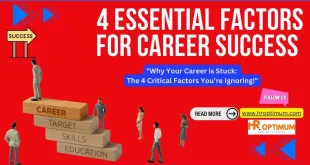Thinking about a career change or wanting to move up in your field? You’re not alone. Many people switch jobs for new opportunities or because of layoffs. Changing careers can be a great chance to find new paths and match your work with your values.
Online tools can help you find your skills and career options. A strong personal brand is key to reaching your career goals and smoothly transitioning.
Knowing why you want to leave your job is important for setting the right career goals. By understanding your goals and strengths, you can plan a successful career move. This helps you make smart choices about your next step.
Key Takeaways
- Utilize online assessments to identify skills and career options
- Develop a strong personal brand to achieve professional goals
- Self-assess your goals and strengths to strategize a successful career exit
- Research company culture and values to enhance job prospects
- Continuously network to avoid leaving without a plan
- Align career aspirations with personal values and industry trends
Understanding Your Career Aspirations
Starting your job search means understanding what you want in your career. This journey is key to finding a path that fits your values and needs. Continuous learning and skill development are essential for moving up in your career, with 80% of professionals agreeing.
Identifying your professional values is a big part of this. It’s about knowing what’s important to you, like work-life balance or growth chances. Ask yourself:
- What are my non-negotiables in a career?
- What kind of work environment do I thrive in?
- What are my long-term career goals?
It’s also important to think about your work-life needs. Consider things like flexibility and growth opportunities. Aligning your career goals with your values and interests boosts your job search success and leads to professional growth.
Understanding your career aspirations is a journey of self-discovery. By knowing what drives you, you can make better choices. This leads to a career that fulfills you, making your job search successful.
Evaluating Your Current Skill Set
When thinking about a career transition, it’s key to check your current skills. Look at what you’re good at and what you can improve. A good career transition plan will use your strengths and work on your weaknesses.
Transferable skills are very important today. They can be used in many jobs and fields. Skills like communication, leadership, and problem-solving are valuable. You can show these skills in your resume, cover letters, and business cards.
Some important transferable skills include:
- Communication skills: public speaking, listening, written and electronic communication, and negotiating skills
- Leadership/Management skills: planning and coordination, conflict management, self-evaluation, and delegation
- Research skills: investigation, problem-solving, writing proposals, and internet research
Knowing your skills and what you need to work on is the first step. Then, you can make a career transition plan to reach your goals. This plan should include learning new skills, networking, and showing yourself to employers. With a good plan, you can succeed in your career.
Exploring New Career Options
As you move through your career, it’s key to look into new options that match your values, interests, and skills. It takes about 4.5 years to move out of a job you don’t like. This shows why starting early is important. Around 70% of workers feel unhappy at work, making career coaching and counseling vital.
When looking into new careers, follow these steps:
- Research growing industries and job trends to find areas with growth and development
- Network with industry pros for advice on your career path
- Check salaries and job needs to see if they match your skills and lifestyle
Being proactive in exploring careers can lead to a fulfilling job. Career coaching and counseling offer great help during this time. With the right mindset and tools, you can overcome career change hurdles and find a job that makes you happy and successful.
Building Your Career Development Strategy
As you move through your career, focusing on professional development is key. It’s important to set clear goals, find areas to improve, and plan how to reach them. This will help you stay competitive in today’s fast-changing job market.
Studies show that investing in career development boosts employee retention and happiness. In fact, those who plan their career development are 30% more likely to be job-satisfied. To start, focus on these essential parts of a good career development plan:
- Know your strengths and weaknesses
- Set both short-term and long-term career goals
- Make a plan to reach your goals, including getting career advice and taking professional development steps
By taking charge of your career development, you’ll grow your skills and show your dedication to your job. Remember, career advice is out there, and it’s your job to find and use it for your professional development.
In today’s fast-paced job market, staying updated through professional development is vital. By focusing on your career development and seeking career advice, you’ll be on the path to reaching your career dreams and staying ahead.
Making Your Career Transition Plan
When you’re getting ready to change careers, making a plan is key. About 70% of people think about switching careers at some point. A good plan keeps you on track and motivated, boosting your success chances.
Think about these important parts when making your plan:
- Check your current skills and experience
- Find areas to improve and grow
- Look into new career paths and industries
- Connect with people in your dream field
Your plan should fit your unique needs and goals. It’s important to set realistic goals and get ready for obstacles. With a strong plan, you’ll be ready to move forward and reach your career dreams. Remember, changing careers takes time and hard work. But with the right plan, you can find a career that matches your values and interests.
Conclusion: Taking the First Step on Your New Career Journey
Your career journey is always evolving, full of new chances. By thinking about what matters to you, what you enjoy, and your skills, you’re ready to find new paths. Remember, career development is a journey, not a single event.
The tips and ideas from this article will help you start your career change. You might want to grow in your current job or move to a new field. The important thing is to stay open, curious, and dedicated to your growth.
Start today by looking into new industries, meeting people in your field, and making a plan. With hard work and a positive attitude, you’ll find your next great career. The future is full of possibilities, so dive in and discover your full abilities.
FAQ
What is the importance of self-discovery and exploration in finding the right career path?
Self-discovery and exploration are key to finding the right career. They help you understand what you want to achieve and what you value in your work. This way, you can find a job that matches your goals and makes you happy.
How can evaluating your current skill set help with a career change?
Looking at your current skills is important when you want to change careers. It helps you see what you need to work on. This way, you can plan how to get the skills you need for your new career.
What are the benefits of exploring new career options and researching growing industries?
Looking into new careers and growing industries can open up exciting opportunities. It lets you find jobs that match your values and interests. Plus, talking to people in your desired field and checking out salaries can give you useful information.
How can building a career development strategy and creating a plan for professional development support your career goals?
Having a career plan helps you reach your goals. It means setting goals that match your values and interests. It also means always learning and improving your skills.
What are the key steps in making a successful career transition?
A successful career change needs a clear plan and achievable goals. It’s also important to be ready for any challenges. This way, you can smoothly move into your new career.
 Hroptimum Leading to Success
Hroptimum Leading to Success




